harmony 鸿蒙Web组件对接软键盘
Web组件对接软键盘
开发者能够通过Web组件对接软键盘,来处理系统软键盘的显示与交互问题,同时实现软键盘的自定义功能。主要有以下场景:
- 拉起系统软键盘输入文字:点击网页输入框时,屏幕下方将弹出系统默认的软键盘。开发者可以通过软键盘输入文字,输入的内容会显示在输入框中。
- 自定义系统软键盘的回车键类型:设置不同的Web页面软键盘避让模式,例如:确认、下一个和提交。
- 软键盘避让:在移动设备上,由于输入法通常固定在屏幕下半段,应用可设置不同的Web页面软键盘避让模式,来避让软键盘。例如:平移、调整大小和不避让。
- 自定义软键盘输入:在移动设备上,可以使用自绘制输入法在Web页面输入,以此替代系统软键盘。
Web页面输入框输入与软键盘交互的W3C标准支持
为支持Web页面与系统软键盘、自定义软键盘等的良好交互,ArkWeb遵循并实现了W3C规范中的以下输入控制属性: - type属性
type属性定义了input元素的类型,影响输入的验证、显示方式和键盘类型。常见的type值包括:
| type值 | 描述 |
|---|---|
| text | 默认值。普通文本输入 |
| number | 数字输入 |
| 电子邮件地址输入 | |
| password | 密码输入 |
| tel | 电话号码输入 |
| url | URL输入 |
| date | 日期选择器 |
| time | 时间选择器 |
| checkbox | 复选框 |
| radio | 单选按钮 |
| file | 文件上传 |
| submit | 提交按钮 |
| reset | 重置按钮 |
| button | 普通按钮 |
- inputmode属性
inputmode属性用于配置输入法类型,默认值:text。
| inputmode | 描述 |
|---|---|
| decimal | 只显示数字键盘,通常还有一个逗号键。 |
| 文本键盘,键通常用于电子邮件地址,如[@]。 | |
| none | 不应出现键盘。 |
| numeric | 只显示数字键盘。 |
| search | 文本键盘,[enter]键通常显示为[go]。 |
| tel | 只显示数字键盘,通常还有[+]、[*]和[#]键。 |
| text | 默认文本键盘。 |
| url | 文本键盘,键通常用于网址,如[.]和[/],以及特殊的[.com]键,或者其他通常用于本地设置的域名结束符。 |
- enterkeyhint属性
enterkeyhint属性用于指定移动设备虚拟键盘上回车键的显示方式。
| enterkeyhint值 | 描述 |
|---|---|
| enter | 显示默认的回车键 |
| done | 表示输入完成 |
| go | 表示跳转或执行 |
| next | 进入下一个输入字段 |
| previous | 返回上一个输入字段 |
| search | 执行搜索 |
| send | 发送信息 |
说明:
点击网页输入框时,屏幕下方将弹出系统默认的软键盘,开发者可以进行文字输入。
type属性影响键盘显示、输入验证和元素外观。
inputmode优化移动设备键盘输入体验,不影响基本行为或验证。
软键盘自动弹出
为提升用户体验,可以在页面完成加载后,输入框自动获焦并弹出软键盘。通过调用showTextInput()设置软键盘自动弹出功能。
<!-- index.html -->
<!DOCTYPE html>
<html>
<head>
<title>测试网页</title>
</head>
<body>
<h1>DEMO</h1>
<input type="text" id="input_a">
</body>
</html>
//Index.ets
import { webview } from '@kit.ArkWeb';
import { inputMethod } from '@kit.IMEKit';
@Entry
@Component
struct WebComponent {
controller: webview.WebviewController = new webview.WebviewController();
build() {
Column() {
Web({ src: $rawfile("index.html"), controller: this.controller})
.onPageEnd(() => {
this.controller.runJavaScript(`document.getElementById('input_a').focus()`).then(() => {
setTimeout(() => {
inputMethod.getController().showTextInput();
}, 10);
});
});
}
}
}
设置软键盘避让模式
在移动设备上,支持设置Web页面的输入法避让模式。
在应用代码中设置UIContext的软键盘避让模式setKeyboardAvoidMode()。ArkWeb组件支持Resize和Offset两种模式。
Resize模式下,应用窗口高度可缩小避开软键盘,ArkWeb组件跟随ArkUI重新布局。
Offset模式下(以及默认模式),应用窗口高度不变,ArkWeb组件根据自身的避让模式进行避让。
(1)设置UIContext的软键盘避让模式。
// EntryAbility.ets
import { KeyboardAvoidMode } from '@kit.ArkUI';
import { hilog } from '@kit.PerformanceAnalysisKit';
onWindowStageCreate(windowStage: window.WindowStage) {
hilog.info(0x0000, 'testTag', '%{public}s', 'Ability onWindowStageCreate');
windowStage.loadContent('pages/Index', (err, data) => {
let keyboardAvoidMode = windowStage.getMainWindowSync().getUIContext().getKeyboardAvoidMode();
// 设置虚拟键盘抬起时压缩页面大小为减去键盘的高度
windowStage.getMainWindowSync().getUIContext().setKeyboardAvoidMode(KeyboardAvoidMode.RESIZE);
if (err.code) {
hilog.error(0x0000, 'testTag', 'Failed to load the content. Cause: %{public}s', JSON.stringify(err) ?? '');
return;
}
hilog.info(0x0000, 'testTag', 'Succeeded in loading the content. Data: %{public}s', JSON.stringify(data) ?? '');
});
}
(2)在Web组件中调起软键盘。
<!-- index.html -->
<!DOCTYPE html>
<html>
<head>
<title>测试网页</title>
</head>
<body>
<h1>DEMO</h1>
<input type="text" id="input_a">
</body>
</html>
//Index.ets
import { webview } from '@kit.ArkWeb';
@Entry
@Component
struct KeyboardAvoidExample {
controller: webview.WebviewController = new webview.WebviewController();
build() {
Column() {
Row().height("50%").width("100%").backgroundColor(Color.Gray)
Web({ src: $rawfile("index.html"),controller: this.controller})
Text("I can see the bottom of the page").width("100%").textAlign(TextAlign.Center).backgroundColor(Color.Pink).layoutWeight(1)
}.width('100%').height("100%")
}
}
ArkWeb组件将跟随ArkUI重新布局,效果如图1和图2所示。
图1 Web组件网页默认软键盘避让模式
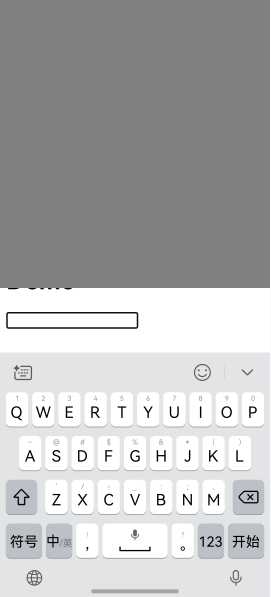
图2 Web组件网页跟随Arkui软键盘避让模式
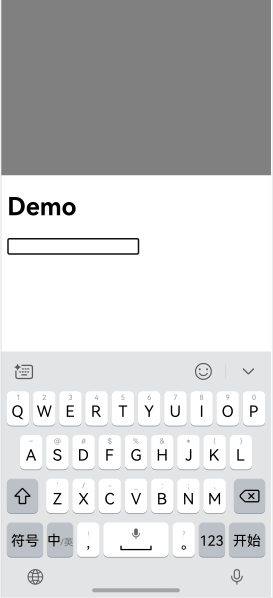
2.在UIContext的键盘避让模式为Offset模式时,应用可通过WebKeyboardAvoidMode()设置ArkWeb组件的键盘避让模式。Web组件的WebKeyboardAvoidMode()接口优先级高于W3C侧virtualKeyboard.overlayContens。
- RESIZE_VISUAL:仅调整可视视口的大小,而不调整布局视口的大小。
- RESIZE_CONTENT:调整视觉视口和布局视口的大小。
- OVERLAYS_CONTENT:不调整任何视口的大小,获焦input元素没有滚动到可识区域的行为。
说明:
可视视口指用户正在看到的网站的区域,该区域的宽度等于移动设备的浏览器窗口的宽度。
布局视口指网页本身的宽度。
在应用代码中设置ArkWeb的软键盘避让模式。
// Index.ets
import { webview } from '@kit.ArkWeb';
@Entry
@Component
struct KeyboardAvoidExample {
controller: webview.WebviewController = new webview.WebviewController();
build() {
Column() {
Row().height("50%").width("100%").backgroundColor(Color.Gray)
Web({ src: $rawfile("index.html"),controller: this.controller})
.keyboardAvoidMode(WebKeyboardAvoidMode.OVERLAYS_CONTENT) //此时ArkWeb组件不会调整任何视口的大小。
Text("I can see the bottom of the page").width("100%").textAlign(TextAlign.Center).backgroundColor(Color.Pink).layoutWeight(1)
}.width('100%').height("100%")
}
}
ArkWeb组件根据避让模式进行避让,效果见图3。
图3 Web组件网页自身软键盘避让模式
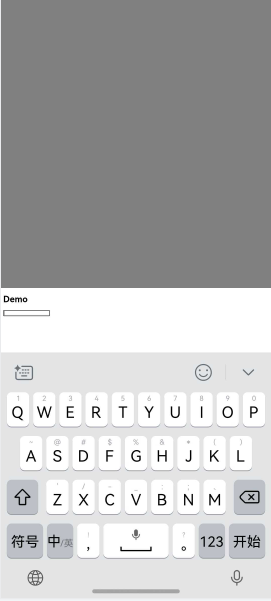
3.在软键盘弹出时,为使Web组件不发生避让行为,可通过调用expandSafeArea()设置Web组件扩展安全区域。更多详细示例可参考网页中安全区域计算和避让适配。
// xxx.ets
import { webview } from '@kit.ArkWeb';
@Entry
@Component
struct WebComponent {
controller: webview.WebviewController = new webview.WebviewController();
build() {
Column() {
Web({ src: 'www.example.com', controller: this.controller })
.width('100%').height('100%')
.expandSafeArea([SafeAreaType.KEYBOARD, SafeAreaType.SYSTEM])
}
}
}
与其他Web组件行为的交互场景:
| 交叉场景 | 规格 |
|---|---|
| 同层渲染 | 同层Web:软键盘避让方式与普通场景相同。 同层系统组件:由ArkUI负责软键盘避让模式。 |
| 离屏创建组件 | 默认使用与非离屏创建一致的软键盘避让模式 在上树前设置其他避让模式可需生效。 |
| customDialog | customDialog自身避让。 |
| 折叠屏 | 软键盘避让行为与普通场景行为一致。软件键盘将根据屏幕开合状态进行调整。 |
| 软键盘托管 | 软键盘避让行为与普通场景行为一致。 |
| Web嵌套滚动 | 在嵌套滚动场景下,建议不要使用Web软键盘避让,包括RESIZE_VISUAL和RESIZE_CONTENT。 |
拦截系统软键盘与自定义软键盘输入
应用可以通过调用onInterceptKeyboardAttach标签即将触发软键盘显示时,onInterceptKeyboardAttach被回调。应用可以使用此接口控制软键盘的显示,包括系统默认软键盘、带有特定Enter键的软键盘,或完全自定义软键盘。借助这一功能,开发者能够实现对软键盘的灵活管理。
- 使用系统默认软键盘
- 使用带有定制Enter键的系统软键盘
- 使用完全由应用程序自定义的软键盘
// Index.ets
import { webview } from '@kit.ArkWeb';
import { inputMethodEngine } from '@kit.IMEKit';
@Entry
@Component
struct WebComponent {
controller: webview.WebviewController = new webview.WebviewController();
webKeyboardController: WebKeyboardController = new WebKeyboardController();
inputAttributeMap: Map<string, number> = new Map([
['UNSPECIFIED', inputMethodEngine.ENTER_KEY_TYPE_UNSPECIFIED],
['GO', inputMethodEngine.ENTER_KEY_TYPE_GO],
['SEARCH', inputMethodEngine.ENTER_KEY_TYPE_SEARCH],
['SEND', inputMethodEngine.ENTER_KEY_TYPE_SEND],
['NEXT', inputMethodEngine.ENTER_KEY_TYPE_NEXT],
['DONE', inputMethodEngine.ENTER_KEY_TYPE_DONE],
['PREVIOUS', inputMethodEngine.ENTER_KEY_TYPE_PREVIOUS]
])
/**
* 自定义键盘组件Builder
*/
@Builder
customKeyboardBuilder() {
// 这里实现自定义键盘组件,对接WebKeyboardController实现输入、删除、关闭等操作。
Row() {
Text("完成")
.fontSize(20)
.fontColor(Color.Blue)
.onClick(() => {
this.webKeyboardController.close();
})
// 插入字符。
Button("insertText").onClick(() => {
this.webKeyboardController.insertText('insert ');
}).margin({
bottom: 200,
})
// 从后往前删除length参数指定长度的字符。
Button("deleteForward").onClick(() => {
this.webKeyboardController.deleteForward(1);
}).margin({
bottom: 200,
})
// 从前往后删除length参数指定长度的字符。
Button("deleteBackward").onClick(() => {
this.webKeyboardController.deleteBackward(1);
}).margin({
left: -220,
})
// 插入功能按键。
Button("sendFunctionKey").onClick(() => {
this.webKeyboardController.sendFunctionKey(6);
})
}
}
build() {
Column() {
Web({ src: $rawfile('index.html'), controller: this.controller })
.onInterceptKeyboardAttach((KeyboardCallbackInfo) => {
// option初始化,默认使用系统默认键盘
let option: WebKeyboardOptions = {
useSystemKeyboard: true,
};
if (!KeyboardCallbackInfo) {
return option;
}
// 保存WebKeyboardController,使用自定义键盘时候,需要使用该handler控制输入、删除、软键盘关闭等行为
this.webKeyboardController = KeyboardCallbackInfo.controller;
let attributes: Record<string, string> = KeyboardCallbackInfo.attributes;
// 遍历attributes
let attributeKeys = Object.keys(attributes);
for (let i = 0; i < attributeKeys.length; i++) {
console.log('WebCustomKeyboard key = ' + attributeKeys[i] + ', value = ' + attributes[attributeKeys[i]]);
}
if (attributes) {
if (attributes['data-keyboard'] == 'customKeyboard') {
// 根据html可编辑元素的属性,判断使用不同的软键盘,例如这里如果属性包含有data-keyboard,且值为customKeyboard,则使用自定义键盘
console.log('WebCustomKeyboard use custom keyboard');
option.useSystemKeyboard = false;
// 设置自定义键盘builder
option.customKeyboard = () => {
this.customKeyboardBuilder()
}
return option;
}
if (attributes['keyboard-return'] != undefined) {
// 根据html可编辑元素的属性,判断使用不同的软键盘,例如这里如果属性包含有keyboard-return,使用系统键盘,并且指定系统软键盘enterKey类型
option.useSystemKeyboard = true;
let enterKeyType: number|undefined = this.inputAttributeMap.get(attributes['keyboard-return']);
if (enterKeyType != undefined) {
option.enterKeyType = enterKeyType;
}
return option;
}
}
return option;
})
}
}
}
<!-- index.html -->
<!DOCTYPE html>
<html>
<head>
<meta charset="utf-8">
<meta name="viewport" content="width=device-width,minimum-scale=1.0,maximum-scale=1.0">
</head>
<body>
<p style="font-size:12px">input标签,原有默认行为:</p>
<input type="text" style="width: 300px; height: 20px"><br>
<hr style="height:2px;border-width:0;color:gray;background-color:gray">
<p style="font-size:12px">input标签,系统键盘自定义enterKeyType属性 enter key UNSPECIFIED:</p>
<input type="text" keyboard-return="UNSPECIFIED" style="width: 300px; height: 20px"><br>
<hr style="height:2px;border-width:0;color:gray;background-color:gray">
<p style="font-size:12px">input标签,系统键盘自定义enterKeyType属性 enter key GO:</p>
<input type="text" keyboard-return="GO" style="width: 300px; height: 20px"><br>
<hr style="height:2px;border-width:0;color:gray;background-color:gray">
<p style="font-size:12px">input标签,系统键盘自定义enterKeyType属性 enter key SEARCH:</p>
<input type="text" keyboard-return="SEARCH" style="width: 300px; height: 20px"><br>
<hr style="height:2px;border-width:0;color:gray;background-color:gray">
<p style="font-size:12px">input标签,系统键盘自定义enterKeyType属性 enter key SEND:</p>
<input type="text" keyboard-return="SEND" style="width: 300px; height: 20px"><br>
<hr style="height:2px;border-width:0;color:gray;background-color:gray">
<p style="font-size:12px">input标签,系统键盘自定义enterKeyType属性 enter key NEXT:</p>
<input type="text" keyboard-return="NEXT" style="width: 300px; height: 20px"><br>
<hr style="height:2px;border-width:0;color:gray;background-color:gray">
<p style="font-size:12px">input标签,系统键盘自定义enterKeyType属性 enter key DONE:</p>
<input type="text" keyboard-return="DONE" style="width: 300px; height: 20px"><br>
<hr style="height:2px;border-width:0;color:gray;background-color:gray">
<p style="font-size:12px">input标签,系统键盘自定义enterKeyType属性 enter key PREVIOUS:</p>
<input type="text" keyboard-return="PREVIOUS" style="width: 300px; height: 20px"><br>
<hr style="height:2px;border-width:0;color:gray;background-color:gray">
<p style="font-size:12px">input标签,应用自定义键盘:</p>
<input type="text" data-keyboard="customKeyboard" style="width: 300px; height: 20px"><br>
</body>
</html>
ArkWeb自定义键盘的示例效果如图4、图5和图6所示。
图4 ArkWeb自定义键盘数字键盘
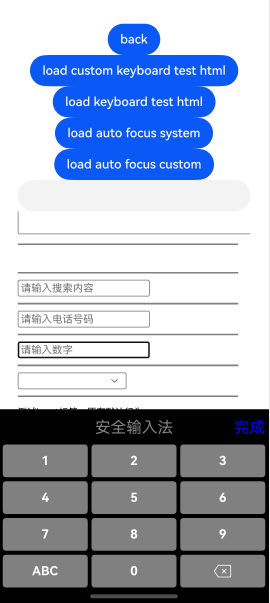
图5 ArkWeb自定义键盘字母键盘
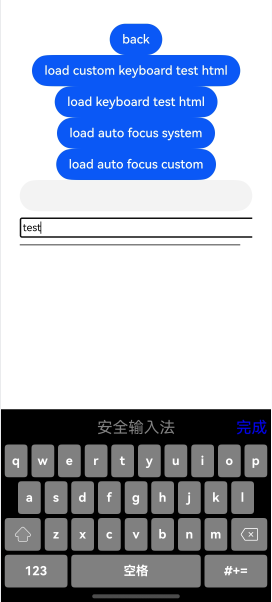
图6 ArkWeb自定义键盘符号键盘
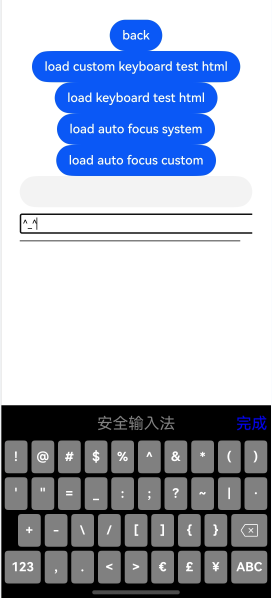
你可能感兴趣的鸿蒙文章
harmony 鸿蒙应用侧与前端页面的相互调用(C/C++)
harmony 鸿蒙建立应用侧与前端页面数据通道(C/C++)